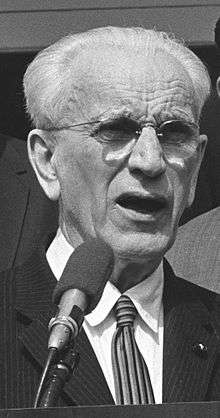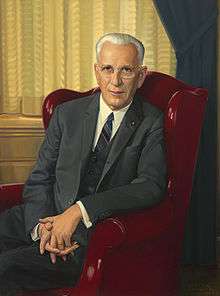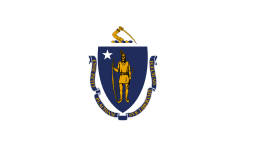John William McCormack
| John William McCormack | |
|---|---|
 McCormack in 1965 | |
| 45th Speaker of the United States House of Representatives | |
|
In office January 10, 1962 – January 3, 1971 | |
| President |
John F. Kennedy Lyndon B. Johnson Richard Nixon |
| Preceded by | Sam Rayburn |
| Succeeded by | Carl Albert |
| Member of the U.S. House of Representatives from Massachusetts's 9th district | |
|
In office January 3, 1963 – January 3, 1971 | |
| Preceded by | Hastings Keith |
| Succeeded by | Louise D. Hicks |
| Member of the U.S. House of Representatives from Massachusetts's 12th district | |
|
In office November 6, 1928 – January 3, 1963 | |
| Preceded by | James A. Gallivan |
| Succeeded by | Hastings Keith |
| Member of the Massachusetts House of Representatives from the 11th Suffolk district[1] | |
|
In office 1920–1922 | |
| Member of the Massachusetts Senate | |
|
In office 1923-1926 | |
| Personal details | |
| Born |
December 21, 1891 Boston, Massachusetts, U.S. |
| Died |
November 22, 1980 (aged 88) Dedham, Massachusetts, U.S. |
| Political party | Democratic |
| Spouse(s) |
Harriet McCormack (m.1920–1971; her death) |
| Profession | Lawyer |
| Religion | Roman Catholic |
John William McCormack (December 21, 1891 – November 22, 1980) was an American politician who served as the 45th Speaker of the United States House of Representatives from 1962 to 1971, representing Massachusetts as a Democrat from 1928 to 1971, their longest-serving congressman.
Early life
McCormack was born in Boston to Joseph H. McCormack, a hod carrier and native of Prince Edward Island, Canada, and his wife Mary Ellen (O'Brien) McCormack of Boston (1861-1913). He said he was one of 12 children, several of whom died as children or young adults. In fact, Mary Ellen McCormack carried eight children to term, and six lived long enough to be counted in he census or included in other records. John McCormack's older siblings Patrick (d.1911), Catherine (d. 1906), and James (d. 1906) died at ages 24, 19 and 17, respectively. His brother Edward ("Knocko") died in Boston in 1963 at age 67. McCormack's brother Donald died in Texas in 1966 at the age of 65. McCormack also had a half brother named Harry from his father's first marriage; Harry died on Prince Edward Island at age 18 in 1902.[2]
McCormack said for most of his life that his father died when McCormack was 13; other sources indicate that his father actually left the family and moved to Waldoboro, Maine, where he worked in the local granite quarries. He died in 1929, and was buried in a pauper's grave at Waldoboro Rural Cemetery.[3]
McCormack attended the John Andrew Grammar School through the eighth grade. He then left school to help support his family, initially working for $3 a week as an errand boy for a brokerage firm. McCormack and his brothers also managed a large newspaper delivery route for $11 a week. He later left the brokerage for the office of attorney William T. Way, where he received a 50-cent a week increase. He began to study law with Way and passed the Massachusetts bar exam at age 21, despite not having gone to high school or college.
Start of political career
As a young man, McCormack began his involvement in politics by making campaign speeches on behalf of other Democratic candidates. In May 1917, McCormack was elected to serve as a member of the Massachusetts Constitutional Convention of 1917, representing the 11th Suffolk District of the Massachusetts House of Representatives.[4]
World War I
In 1917, McCormack enlisted in the United States Army for World War I. He was posted to Fort Devens, Massachusetts and Fort Lee, Virginia, and attained the rank of sergeant major before being discharged in 1919.[5]
Continued political career
After the war McCormack practiced law and resumed his political career. He soon entered the state legislature, representing the 11th Suffolk District[1] in the House from 1920 to 1922 and serving in the Senate from 1923 to 1926, including holding the leadership position of Democratic floor leader in 1925 and 1926. In 1926 he made an unsuccessful primary election run against incumbent Congressman James A. Gallivan. McCormack made a favorable impression in a losing cause, leaving him well positioned for a future race. He resumed practicing law, and built a successful career as a trial attorney, which enabled him to enjoy an income that reached $30,000 a year (approximately $400,000 in 2016).
Congressional career
McCormack's opportunity came after Gallivan died in 1928. That November McCormack won both the special election to complete Gallivan's term in the U.S. House as well as the general election for a full term. He was reelected 20 times, initially from the 12th District, and from the re-numbered 9th after 1963. McCormack usually won reelection without difficulty, and he served in the House from November 6, 1928 to January 3, 1971 (the 70th to 91st Congresses). He did not run for reelection in 1970.
During his House career, McCormack served on the Committee on Territories, and the Committee on Ways and Means. He was chairman of the Select Committee on Astronautics and Space Exploration in the 85th Congress (1957 to 1959).
Early Congressional career
Speaker John Nance Garner appointed McCormack to the powerful Ways and Means Committee in his second term, and he served there until 1941. He maintained a consistently liberal voting record throughout his Congressional career, including support for the New Deal.
In 1934 he served as chairman of the Special Committee on Un-American Activities, known as the McCormack-Dickstein Committee, which investigated Nazi propaganda and recruitment efforts in the United State prior to World War II.
An internationalist and staunch anti-communist, he played a key role in extending the military draft just before the Attack on Pearl Harbor at a time when isolationist sentiment and opposition to U.S. involvement in the war were still strong.
Majority leader
When Sam Rayburn became Speaker in 1940, he backed McCormack for majority leader, a key factor in McCormack's victory over Clifton A. Woodrum. For the next 21 years, McCormack was the second-ranking Democrat in the House; he served as majority leader with Rayburn as Speaker when Democrats had the majority (1939-1947, 1951-1953, 1955-1961), and as minority whip with Rayburn as minority leader when the Republicans controlled the House (1947-1949, 1953-1955).
Speaker of the House
After Rayburn's death in November 1961, McCormack ascended to the speakership, and he served until retiring from the House in 1971.
McCormack's nine years as Speaker included the passage of landmark legislation in civil rights, for which he was an early advocate, education, and health care for the elderly. He presided over House passage of Great Society legislation during the administration of Lyndon B. Johnson.
The latter part of McCormack's tenure increasingly focused on the debate over the Vietnam War, which he supported. McCormack's demeanor changed during these years and he reminded some observers of a kindly elder relative attempting to provide wisdom and guidance to unruly younger family members.
According to House members, McCormack's strength was his personal consideration of members, which inspired them to return his affection and sparked a desire to work with him. His weakness was that the seniority system created entrenched committee chairmen who wielded great power in the House, but could not be controlled by the Speaker.
As Speaker, McCormack pursued a national agenda. He was proud of fighting for passage of farm bills, though he said he did not have "more than five flower pots in my whole district."
Between the assassination of President John F. Kennedy on November 22, 1963, and the swearing-in of Hubert Humphrey as Vice President on January 20, 1965, McCormack was the first person in the line of succession for the Presidency, and he received Secret Service protection. McCormack later recalled his experience as next-in-line in an article he wrote for the Boston Globe.
In January 1969, Arizona Rep. Morris Udall attempted to unseat McCormack. In 1970, the sniping by younger members increased and several congressmen urged McCormack to step down because of his age. Jerome R. Waldie of California asked a party caucus to declare a lack of confidence in his leadership, but it did not do so. McCormack decided not to run for reelection to the House in 1970, but kept his decision secret until he announced it publicly in May 1970. McCormack was succeeded in the House in 1971 by Louise Day Hicks, and as Speaker by Carl Albert.
Retirement and death
McCormack lived in retirement in Boston. He died of pneumonia in a Dedham nursing home on November 22, 1980. He is buried at Saint Joseph Cemetery in West Roxbury, Massachusetts.
Legacy
In 1983, the University of Massachusetts Boston established the John W. McCormack Institute of Public Affairs, named in his honor. In 2003 it was expanded into the John W. McCormack Graduate School of Policy Studies. In 2010, the school expanded its mission and was renamed to the McCormack Graduate School of Policy and Global Studies. The McCormack Graduate School’s current emphasis on social justice, government accountability and transparency, strengthening democratic institutions, and training the next generation of local and global public leaders is John W. McCormack’s living legacy.
Family

In 1920, McCormack married Harriet Joyce, who was seven years older and pursuing a career as an opera singer, an avocation she gave up after her wedding. The McCormacks had no children. While Congress was in session, they lived at the Washington Hotel. Stories about McCormack's devotion to his wife became legendary; friends and colleagues claimed that they always had dinner together, no matter how late McCormack worked, and that they never spent a night apart. Harriet McCormack died in December 1971 after a long hospitalization, aged 87. For more than a year, McCormack had spent every night in an adjoining hospital room.
McCormack and his wife were devout Roman Catholics, and both were honored by the Vatican. He was the first Catholic to be elected Speaker, and some critics complained that his religion sometimes showed in his leadership qualities. As an example, during the 1961 debate on federal aid to schools, McCormack insisted that church schools should be included, and the bill died because of disagreement over this issue.
References
- 1 2 Howard, Richard T. (1920), Public Officials of Massachusetts 1920, Boston, MA: The Boston Review, p. Page 226.
- ↑ Garrison Nelson, "Irish Identity Politics: The Reinvention of Speaker John W. McCormack of Boston", New England Journal of Public Policy 15 (Fall/Winter 1999/2000), 7-34
- ↑ Nelson, Irish Identity Politics
- ↑ Journal of the Constitutional Convention of the Commonwealth of Massachusetts, Boston, MA: Wright & Potter Printing Co., state printers, 1919, pp. 7–8, 11
- ↑ Biography, John W. McCormack: Prepared for the Dedication of John W. McCormack Hall at the University of Massachusetts at Boston. Boston, MA: University of Massachusetts at Boston. April 26, 1985. p. 5.
Bibliography
- "Ex-House Speaker John McCormack Dies", The Washington Post, November 23, 1980.
- Gordon, Lester I. “John McCormack and the Roosevelt Era.” Ph.D. diss., Boston University, 1976.
- Nelson, Garrison. “Irish Identity Politics: The Reinvention of Speaker John W. McCormack of Boston.” New England Journal of Public Policy 15 (Fall/Winter 1999/2000): 7-34.
External links
| Wikimedia Commons has media related to John William McCormack. |
- United States Congress. "John William McCormack (id: M000364)". Biographical Directory of the United States Congress.
- John William McCormack at Find a Grave


